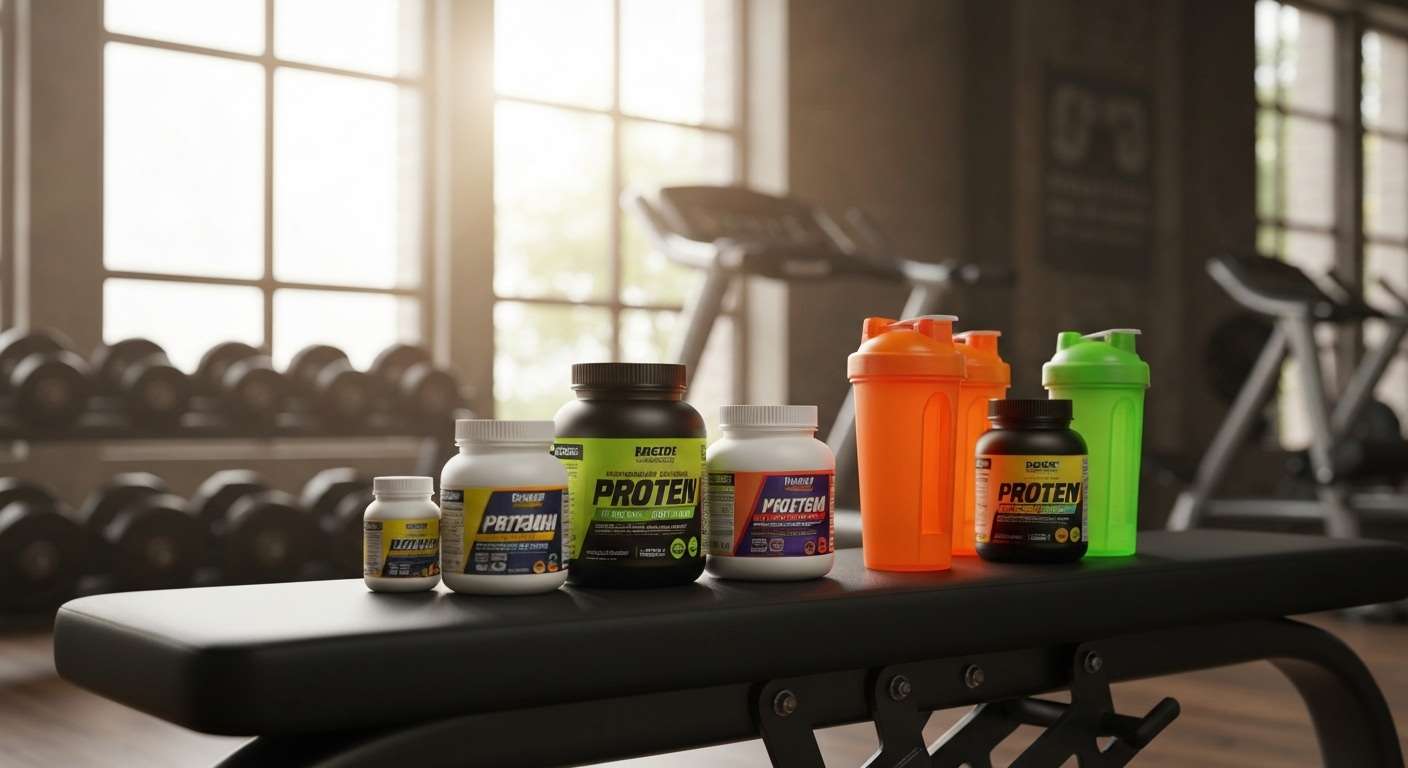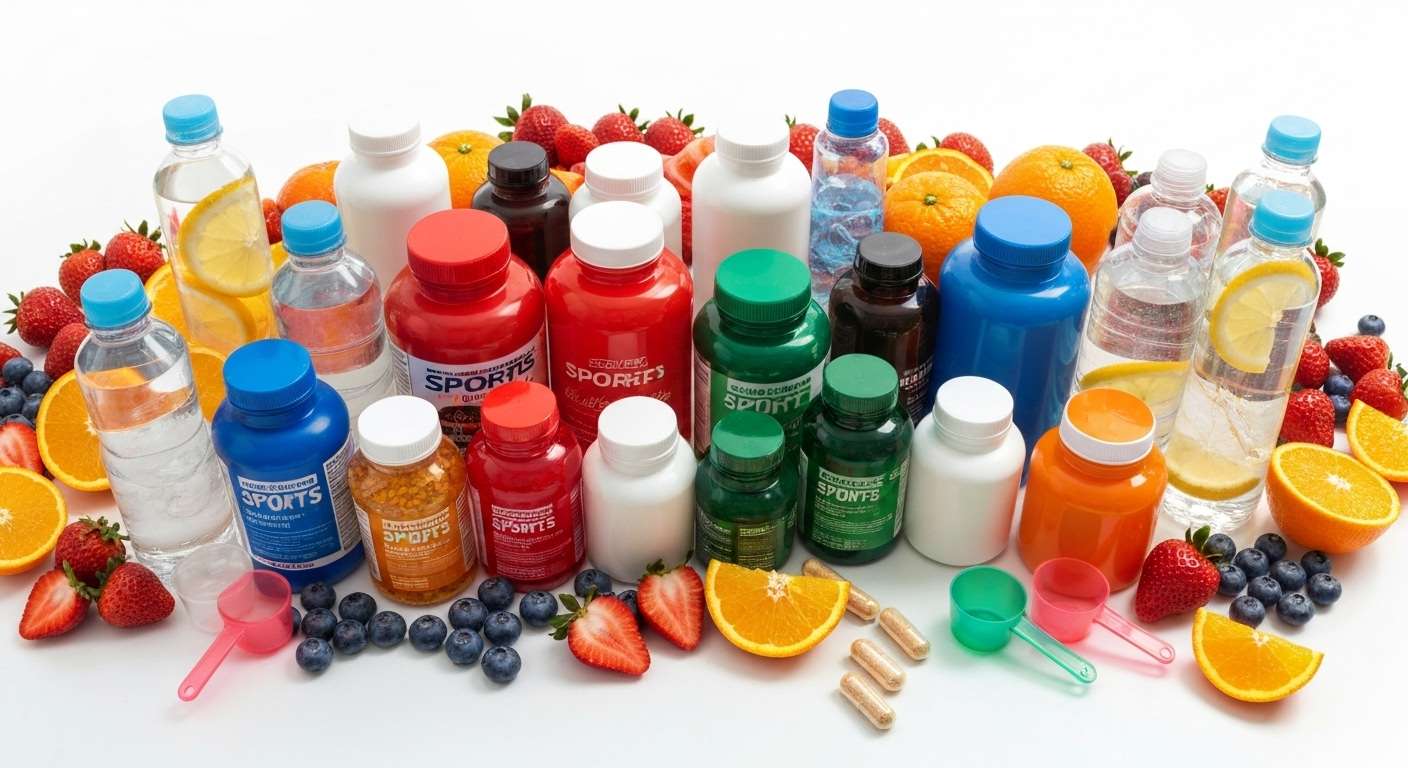Table of Contents
- Key Highlights
- Introduction
- Understanding Sports Nutrition and Its Importance
- Types of Sports Supplements Athletes Commonly Use
- Performance-Enhancing Supplements: Hype vs Evidence
- How to Choose the Right Supplement for Your Sport and Goals
- Timing and Best Practices for Supplement Consumption
- Safety, Side Effects, and Risks of Sports Nutrition Supplements
- Conclusion
- Frequently Asked Questions
Key Highlights
Here is a simple look at what we will talk about in this sports nutrition guide. This guide is about nutrition for people who like sports or want to know more about it. It will help you get the most out of your workouts and feel good about the food you eat.
- The base of sports nutrition is made up of real foods, drinking enough water, and having balanced meals.
- Sports supplements, like whey protein and creatine, help you reach your athletic goals but should not take the place of eating well.
- Knowing about different supplements, such as protein powders and electrolytes, lets you pick the ones that fit your needs.
- There is scientific proof that some supplements work well, but many do not have much strong support yet.
- You should always talk to healthcare pros, like the Dietitians of Canada, before you start any new supplement plan.
Introduction
Welcome to sports nutrition. This is key for anyone, no matter if you are a pro athlete or just train sometimes. What you eat and drink makes a big difference in how you feel and play when you do your sport. In this guide, you will find the basic facts about sports nutrition. You will read about sports supplements, what they do, and how they help athletic performance. We will show you how to use the right nutrition to help your body. You will also see which supplements work and which are only just talk. This will help you make good choices so you can feel safe and be at your best.
Understanding Sports Nutrition and Its Importance

Sports nutrition means using the food and drinks you take in to help you get better at your sport. It’s about more than just calories. You need to make a plan for how you eat. The right plan helps you practice, recover, and feel well. A good diet gives you energy for hard practice. It also lets your muscles heal and get stronger.
This means you need to watch what nutrients you take in every day. You should also stay hydrated. You have to know if or when using dietary supplements will help you or not. A planned diet will give you lasting energy every day. This is not like quick boosts you get from energy drinks. We will talk about the main nutrients that you need for sport. We will also look at how good whole foods are compared to supplements.
Key Nutrients Essential for Athletic Performance
Your body needs several kinds of nutrients to work well. These nutrients give you energy for workouts and help you feel better after. If you work out, you need macronutrients. Some of these are carbohydrates, proteins, and fats. You also need micronutrients. Vitamins and minerals are in this group.
You need to get the balance right between whole grains, protein, and healthy fats. Carbohydrates from whole grains give your body most of its energy. Protein help s you make and fix muscle mass. Healthy fats help you keep your energy up and last longer through the day. Make sure you also eat enough calories for what your training needs.
It is very important to drink enough water. When you sweat, you lose water and electrolytes. You need to get this back. If you do not, you can feel tired. Your body will not work as it should. There are some key nutrients you need.
- Carbohydrates: These give you quick energy and also store energy for later.
- Protein: This helps make and fix your body's tissues, like muscles.
- Electrolytes: These include minerals such as sodium and potassium. They keep your body fluids balanced and help your muscles work.
The Role of Balanced Eating vs Supplements
A "food-first" way is always the best when it comes to sports nutrition. Whole foods give you a good mix of nutrients, fiber, and other things your body needs. You cannot get all of these benefits from just one pill or one powder. The body is made to get nutrition from food you eat, such as lean meats, fruits, vegetables, and grains.
But, dietary supplements can sometime ⏰s be help ful. Some athletes have a hard time getting all the nutrition they need by eating food alone. This is when supplements like sports drinks or protein powders can help. These can fill in any gaps in what you eat and give your athletic performance a boost.
Supplements are there to help you out with your food choices, but they should never replace real meals. It is good to use supplements for some things. They might help you feel better after you work out or give you more energy when you play sports for a long time ⏰. Still, be sure that most of your food comes from whole foods. You should use supplements to give you something extra, but they should not be the main part of your diet.
Types of Sports Supplements Athletes Commonly Use
 Many people who play sports use sports supplements because they want to get better. A lot of the products help with muscle growth, support weight loss, or give energy. You can see that whey protein, amino acids, creatine, and other supplements for before your workout are some that people use the most.
Many people who play sports use sports supplements because they want to get better. A lot of the products help with muscle growth, support weight loss, or give energy. You can see that whey protein, amino acids, creatine, and other supplements for before your workout are some that people use the most.
Some sports supplements have been tested many times. Whey protein isolate is one of the best. Studies show that it helps. But some other supplements, like energy drinks and fat burners, might not work so well for most people. These can also be risky to use. If you want to know which sports supplements to take, you should read about each one first. More information about supplements, like creatine and whey protein, is coming up next.
Protein Supplements (Whey, Casein, Plant-Based)
Protein supplements are now one of the most common sports nutrition choices for people. They help you add more protein to your meals. This is key for muscle repair and for your muscles to grow, especially after you work out hard. The amount you should use depends on your body weight and how much exercise or activity you do. These supplements can help you get the nutrition you need in a simple way.
The several types of protein powders are different because of where they come from and how your body takes them in. Whey protein comes from milk and your body can use it fast . It is good for recovery right after you work out. Casein is also made from milk, but your body takes it in slowly. This means you get the amino acids for a longer time ⏰.
Plant proteins, like soy, pea, or rice, suit people who do not eat dairy or who are vegan. There are also protein options like peanut butter powder. Peanut butter powder can be a good choice for some people, too. All of these help you get protein in the way that works best for you.
Here’s a quick comparison:
| Protein Type | Source | Digestion Speed | Best For |
|---|---|---|---|
| Whey Protein | Milk (by-product of cheesemaking) | Fast | Post-workout recovery |
| Casein | Milk | Slow | Before bed or between meals |
| Plant-Based | Soy, pea, rice, hemp, etc. | Varies (moderate) | Vegans, dairy intolerance |
Creatine, BCAAs, and Amino Acids
Other than protein, some sports supplements have certain amino acids. These can help you do better in your workouts. Creatine is one of the most studied supplements out there. It helps your muscles get energy fast when you do tough and short bursts of work, like sprinting or lifting weights. If you use creatine over time, it can help you build more strength and increase muscle mass.
BCAAs stand for Branched-Chain Amino Acids. These have three main types. The names are leucine, isoleucine, and valine. People use bcaas because they think it can help with muscle pain. It may also help people feel less tired after they work out. Some say bcaas can make new muscle grow.
Even though BCAAs are everywhere, remember that whole protein sources like whey already have BCAAs in them. Most people only need to use a good protein supplement, such as whey. That is enough for their needs. But if you are an athlete who does long or tough endurance exercise, there can be an advantage to taking special sports supplements or extra amino acids. These supplements might help you push their body further when the going gets tough.
Performance-Enhancing Supplements: Hype vs Evidence
There are many sports supplements that you can find in the market. A lot of these supplements say they will make your sports performance better. It is not easy to know which sports supplements will help you and which are just good marketing. There is research on some supplements, like creatine and caffeine, that shows they can help you in some situations.
But there are many sports supplements that do not have good proof they work. It is important to be smart when you buy supplements and not get tricked by big promises. Major League Baseball has strong rules for supplements. They want to keep athletes safe from things that may not work or might be banned. Let’s look at what science says about these claims and find out which sports supplements are made for different goals.
Do They Really Work? What Science Says
Yes, some sports supplements can help you. How they work depends on the type of supplements, how much you use, and the sport you play. It is different for each person, too. You have to look for strong science and trusted sources before you decide what to take. Do not just go by what is written on the pack. A lot of sports supplements do not have real studies to show that they do what they say.
One good example from sports nutrition is creatine monohydrate. Research shows that it helps people get stronger and have more power when they do fast bursts of activity. The International Society of Sports Nutrition says, "creatine monohydrate is the most effective supplement for athletes to improve at hard exercises and build lean body mass while training." [Source: [https://jissn.biomedcentral.com/articles/10.1186/s12970-017-0173-z](
This makes creatine a top pick for people who want to get the most out of their training. If you want to work on your strength, nutrition is key, and using creatine can help you reach your goals.
But for many other supplements, there is not enough good proof that they help . Most research on them can be weak or unclear. If you want to get the right sports supplements or nutrition for you, the best way is:
- Look for well-studied ingredients: Choose supplements that are known to work. Creatine, caffeine, and beta-alanine have all been studied for years.
- Be sceptical of miracle claims: Do not believe everything you read. If a product says it is very good or that you will get results fast , it may not be true.
- Consult research reviews: You should read reviews from places like the Australian Institute of Sport. Find out which supplements have good proof that they work.
Supplements Targeted for Strength, Endurance, and Recovery
Different athletic goals need their own kind of nutritional help . You should use supplements based on what you want to get, like strength or endurance or help with recovery. This helps give your body what it needs right when you need it.
For people who want more strength and power, creatine is one of the best supplements to try. It help s you do your best in tough workouts that need quick bursts of effort. If you aim to build endurance, you should go for other supplements, such as beta-alanine. Beta-alanine may help keep acid from building up in your muscles and can also help your body use oxygen better. Carbohydrate drinks are good for making sure you have energy when you are taking part in long events.
If you want to feel better after exercise, the best thing is to eat more protein. Many athletes also take omega-3 fatty acids from fish oil softgels with EPA. These can help calm swelling in the body. A lot of people drink tart cherry juice since it can make your muscles feel less sore after you work out hard. These supplements can help you reach your sports goals.
How to Choose the Right Supplement for Your Sport and Goals
Choosing the right sports supplements can feel hard with so many to pick from. There are a lot of these supplements out there. It might feel confusing at first. The most important thing is to know your goal. Do you want to use them to build muscle, boost endurance, or help with going back to normal after your workout? When you know what you want to get, it will be much easier to find the sports supplements that are best for you.
Before you use any dietary supplements, it’s best to talk to a health care provider or a sports dietitian first. The health care provider or sports dietitian will look at your diet, how much you train, and how healthy you are. With their advice, you get to know what supplements are safe and good for you. You don’t need to spend money on supplements that will not help . This makes sure you buy supplements that truly fit what you need.
Next, you need to know how to read labels. This helps you make a plan that works for you. It is the best way to be sure that you make good choices for your health and how you perform.
Reading Labels and Identifying Certified Supplements
Carefully read the labels on supplements. This is very important for every athlete. The label shows you what is in the product. It tells you how much you should take. It also lets you know if there is anything you may be allergic to. Make sure to check the serving size. Look to see how much of each ingredient is there. Watch out for "proprietary blends." You do not know exactly how much of each ingredient is inside when you see these.
To be safe , always choose supplements that are certified. A supplement with third-party certification gets tested for banned substances. It is also checked to make sure that what is on the label is true. This helps keep you away from bad ingredients and other drug problems. It is always good to talk to your health care provider before you start any new supplements.
To help you pick a good product, there are things you should look out for.
- Third-party testing seals: See if the logo has words like NSF Certified for Sport or Informed-Sport.
- Clear ingredient list: Do not get products that only say "proprietary blends."
- Evidence-based dosages: Look at the amounts for each ingredient. Make sure they fit with what scientists say.
Personalised Supplement Strategies for Different Athletes
There is not one best way for everyone to use sports supplements. Each person will need a plan that is right for them. The plan should match what you need and what works for you. The sport you play, what training you do, your body weight, and your usual food choices all play a part in picking the best supplements for you.
If you are a powerlifter and have a heavy body, you need to get more protein. You may also want to use creatine. If you run marathons and are light, your plan should be different. It is important to take in more electrolytes and eat more carbs. These things help you keep your energy up for longer time ⏰.
It is a good idea to work with a professional. This person can help you make a personal plan that fits your needs. A professional will check your diet and see what may be missing. After that, they will tell you which sports supplements you should use and how much you need to take. The plan will be based on your body weight and your fitness goals. This way, you will know what supplements to buy without wasting money on things that you do not need. Using the right sports supplements can help you get better results and meet your goals.
Timing and Best Practices for Supplement Consumption
After you pick the right supplements, the next thing to do is find out when to take them. The time ⏰ you use your supplements matters, as it can help your body use them better. This is important when you work out or rest afterward. People call this practice nutrient timing. It helps your body get what it needs and make good use of those supplements.
Taking in some nutrients before you work out, during, or after, can help you feel more energy. It can also help you have more endurance and help your muscles feel better after. It is very important to stay hydrated all the time ⏰. You should be sure to drink water all through the day, not just when you exercise. There are some tips below about when to eat and drink, so you can get the best results.
Pre-Workout, Intra-Workout, and Post-Workout Guidelines
The timing of your nutrition and supplements is very important when you work out. You can break it down into three main parts. These are before your workout, while you work out, and after you finish . Each part helps you feel your best, get the most out of your session, and recover quickly.
Eat your meal or snack before your workout, about one to three hours ahead. The goal is to fill up on energy. Try to have carbs that are easy to digest, with a small amount of protein. While you are at the gym or working out, this can be even more important if you go over ninety minutes. The most important thing is staying strong and keeping your hydration up. Simple carbs and electrolytes will help with that.
After working out, focus on getting better and filling up again. Eat protein and carbs within two hours so your body gets energy back and your muscles get to heal.
Here’s a simple breakdown:
- Pre-Workout: The time ⏰ before your workout is great for carbs. Carbs give you energy. This is also when many people use supplements such as caffeine or creatine.
- Intra-Workout: If your session is long, get carbs that your body can use easy. Be sure to put some electrolytes in to help with hydration.
- Post-Workout: After you train, pick both protein and carbs. This helps your body feel good and start to recover.
Use the right nutrition, supplements, creatine, caffeine, hydration, and electrolytes at every step. This will help you get better results. If you take care and use these, it can make a big difference in how you feel and what you can do.
Supplement Timing for Optimal Nutrient Absorption
Getting the most from how the body uses nutrients works best when you choose the right time ⏰ to take supplements. There are times when it helps to take supplements with food. For example, the fat-soluble vitamins A, D, E, and K are better for the body when taken with a meal that has some fat in it. This helps the body to use these supplements well. It can also stop your stomach from feeling bad.
Some supplements work best if you take them when your stomach is empty. There are some amino acids that may not work well together if you eat them with big meals that have lots of protein. It is good to take those supplements on their own and not with big meals. When you know these simple things, you can make sure you get the most out of your supplements.
When you use supplements like creatine, taking them on a regular basis is more important than the exact time ⏰ you take them. For creatine to work well, you have to use it every day so your muscles can keep enough of it over time.
If you want to feel more energy from calories or need to keep up hydration with electrolytes while you work out, then when you take the supplements will be more important. To get the most benefits, always follow the instructions on the label for all supplements.
Safety, Side Effects, and Risks of Sports Nutrition Supplements
Many supplements can be safe when you use them the right way. But you and other people should know there can be some risks. A few side effects from supplements are mild, like stomach problems. But there are other issues that can be more serious for your health. A supplement could cause dehydration in some cases. Some may not go well with prescription medicines and there can be side effects when these are taken together.
If you want to start using supplements, it is good to begin by focusing on food first. Try to add supplements slowly and only bring in one at a time ⏰. The supplement world does not have rules as strict as medicine does, so sometimes there can be things inside supplements that should not be there. A few might be banned too. Knowing about all of this helps you use supplements in a safer way.
Recognising Potential Side Effects and Drug Interactions
Be careful about side effects when you take supplements. A lot of people get stomach cramps, feel bloated, or have nausea. This is common with creatine or high amounts of caffeine. Some things with stimulants can also make you feel shaky, feel anxious, or stop you from sleeping.
You need to think about the risk ️ of mixing supplements and other drugs. Some supplements can change how blood thinners, blood pressure pills, or other medicine work. This is why you should tell your health care provider about every supplement you take. That way, you can stay safe and not get a bad mix.
If you start to take a new supplement and feel something that you did not expect, it is best to stop right away. Talk to a professional for advice. Listen to your body and watch for new signs. It is just as important to note how you feel as it is to keep track of your progress.
Signs of Quality and Avoiding Banned or Dangerous Substances
Taking care of your health is key. You also want to do your best in your athletic career. It is important to know how to choose good supplements. Stay away from those that are unsafe or banned. There are many supplements for sale. Some of them will not help you. A few may even have things in them that can be bad for you.
One way to know if supplements are good is to check for third-party certification. You should look for a seal from an outside testing group on the bottle. These groups help make sure the bottle really has what the label says. They also check that it does not have things banned by big sports groups. This is important for people who will be drug tested in sports.
Here are some steps to help you choose safe supplements:
- Choose certified products: Try to pick supplements that show the Informed-Sport or NSF Certified for Sport mark.
- Buy from reputable brands: It is better to buy from brands that people know and trust. These brands often have a good record for giving clear products.
- Check anti-doping agency lists: You should look over the list of banned things from groups like the World Anti-Doping Agency (WADA).
By taking these steps, you can make good choices. This can help you keep your health safe and protect your future as an athlete. You will also get more from your supplements.
Conclusion
Knowing about sports nutrition can help you do better in your sport. The right food and good supplements give you more strength, better endurance, and help you feel good after practice or a game. What you eat and how you use supplements matters a lot. Not all supplements be the same, so you want to find good ones. Pick good quality products that match your goals and needs. Sports nutrition makes a big difference for you.
Try to eat whole foods whenever you can. Supplements should work with your normal diet, not take its place. If you want to find out more and get tips that match you and your path as an athlete, feel free to reach out for a free chat. Taking good care of your body help s you get better both in the game and outside of it. The right choices you make about sports nutrition, nutrition, and supplements help you get the best results from all your hard work.
Frequently Asked Questions
Are sports supplements safe for teenagers and beginners?
The safety of sports supplements is a big deal, especially for teenagers and people who are new to using them. A lot of experts say people in Canada should be careful with supplements. The Dietitians of Canada also say if you are under 18 years of age, you need to make sure food is the most important thing for you. Before you use any supplements, it is smart to talk to a health care provider first.
Is it better to get nutrients from whole foods or supplements?
It is best to get the nutrients you need from whole foods. Whole foods have a mix of nutrients that you will not get in the same way from supplements. Supplements will not take the place of a good diet. Use them if you want to reach special goals, like getting more endurance for a sport. Talk to a health care provider before you start to use new supplements.
Are sports supplements good for you?
Sports supplements can enhance athletic performance and recovery when used appropriately. They provide essential nutrients that may be lacking in your diet, helping to optimize workouts and overall health. However, it's crucial to consult with a healthcare professional before starting any supplement regimen to ensure safety and effectiveness.
Thank you for reading! If you found this article helpful, please share it with others who might benefit. And remember, your journey is just beginning. Stay curious, stay faithful, and keep shining your light!














